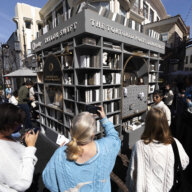Councilman Jim Kenney has announced groundbreaking legislation that he says will make Philadelphia the best city for LGBT-friendly jobs in America. His proposed “equality tax credit” – the first of its kind in the country – would give businesses incentives to offer the same benefit plans to employees in domestic partnerships as they do to those in heterosexual marriages.
“Until now, because of restrictive state laws and court rulings, life partnerships only provided substantive benefits for same-sex couples employed by the city of Philadelphia,” Kenney said in a statement. Equality Forum Director Malcolm Lazin likened the state’s climate, from an LGBT civil rights perspective, to that of Mississippi or Alabama. “But as a result of this landmark legislation, the LGBT community and committed unmarried couples – straight and gay alike – will now benefit immensely,” Kenney said.
Aside from creating a more inclusive environment, the legislation have economic benefits, according to Kenney. “Young entrepreneurs and start-up business owners specifically target communities that are diverse and that are inclusive and opening to all folks because they know those are best incubators and where the most ideas are concentrated,” Kenney’s legislative aide Chris Goy said. “Our goal is to make Philadelphia the most gay-friendly city in America, both on the streets, in hospitals, in government and, specifically in this case, in the workplace.”
The reforms would also extend real estate transfer tax exemptions to domestic partners, strengthen the existing benefits extended to municipal employees’ life partners and further ensure hospitals citywide do not deny partners’ decision-making rights in dire or end-of-life circumstances. “We’re certainly breaking a lot of ground and proposing legislation in a way that hasn’t really been done in other major cities, but we’re not asking for special treatment – we’re asking for equal treatment,” Goy said. “The only thing we’ve done in this legislation is recognize the inequality that already existed for taxpaying, hardworking Philadelphians.”
Though a somewhat similar set of reforms was passed by City Council in 1998 and later largely struck down by the state Supreme Court, the bill’s supporters don’t foresee a similar fate. “I think in terms of society, and to some degree the courts are a reflection of society, things have taken a quantum leap from 1998 to the present,” Lazin said.
The details
Aside from the tax credit, the bill would:
– Standardize protections for life-partnered municipal employees, which are already uniformly practiced citywide, but are not written into the codes of all city departments.
– Educate new life partners about living wills and powers of attorney, plus help guide them through the legal process to become the designated decision-maker for their partner in emergencies.
– Extend the real estate transfer exemption from property transfers between spouses to property transfers between all domestic partners.
– Further guarantee that hospitals citywide will allow domestic partners the same visitation and medical decision-making rights as those granted to spouses.
– Amend all city forms to include a “self-identify” gender option and the option to indicate “Parent 1” and “Parent 2” on those that require parental information.





























